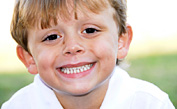Hearing Loss in Children
 A child’s development, including social skills, communication, and language, can be greatly affected by hearing loss. The earlier hearing loss is diagnosed, the earlier treatment can start. One treatment of hearing loss in children is hearing aids. For our patients in Mesa, hearing aids may be used in children as young as 1 month old. Unfortunately, it is not uncommon for hearing loss to go undiscovered until a child is over the age of 2. Hearing loss can be difficult to identify at an early age because it is often not noticed until delays in speech and language appear. Other Mesa hearing loss treatmentsinclude medications, cochlear implants, and ear tubes.
A child’s development, including social skills, communication, and language, can be greatly affected by hearing loss. The earlier hearing loss is diagnosed, the earlier treatment can start. One treatment of hearing loss in children is hearing aids. For our patients in Mesa, hearing aids may be used in children as young as 1 month old. Unfortunately, it is not uncommon for hearing loss to go undiscovered until a child is over the age of 2. Hearing loss can be difficult to identify at an early age because it is often not noticed until delays in speech and language appear. Other Mesa hearing loss treatmentsinclude medications, cochlear implants, and ear tubes.
Signs of Hearing Loss in Babies and Children
The signs of hearing loss vary from child to child. If you are concerned that your child has hearing loss, please schedule an appointment. Children who have passed a hearing screening in the past may still be suffering from hearing loss.
A baby may be suffering from hearing loss if he or she:
- Does not startle at loud noises, such as clapping
- Appears to hear some words, but not all
- Does not say single words, such as “dada” and “mama” by 1 year of age
- Does not turn to the source of a sound at 6 months old
A child may be suffering from hearing loss if speech is difficult to understand and he or she:
- Experiences delayed speech development
- Watches the television with the volume turned up high
- Asks for things to be repeated
- Does not follow directions or appears to not be paying attention
Causes of Hearing Loss in Children
There are many reasons a child may experience hearing loss, including:
- Congenital hearing loss (genetics): Hearing loss that is present at birth is called congenital hearing loss. There are many genetic factors that can result in hearing loss in children.
- Autosomal dominant hearing loss: In cases in which one parent carries the dominant gene for hearing loss and has hearing loss, there is a 50 percent probability that the child will also have hearing loss. The probability is even higher if both parents have a dominant gene.
- Autosomal recessive hearing loss: There is a 25 percent probability of hearing loss in the child if both parents have normal hearing but carry a recessive gene.
- Congenital factors (prenatal): Prenatal illnesses and infections, premature birth, and maternal diabetes can cause hearing loss.
- Acquired hearing loss: Hearing loss that occurs after birth is called acquired hearing loss. Common causes of acquired hearing loss include noise exposure, flu, chicken pox, and a head injury.
- Otitis media: This is an infection or inflammation of the middle ear that causes fluid to build-up. This build-up of fluid dampens the vibrations of the eardrum. Because of this, temporary hearing loss may occur. Chronic otitis media can cause the eardrum to collapse, which results in hearing loss. Medication or surgery may be necessary to remove the infected tissue and to restore hearing.
Contact Fynes Audiology Today
To learn more about the signs, causes, and treatments of hearing loss in children, or to schedule an appointment, please contact Fynes Audiology today.
